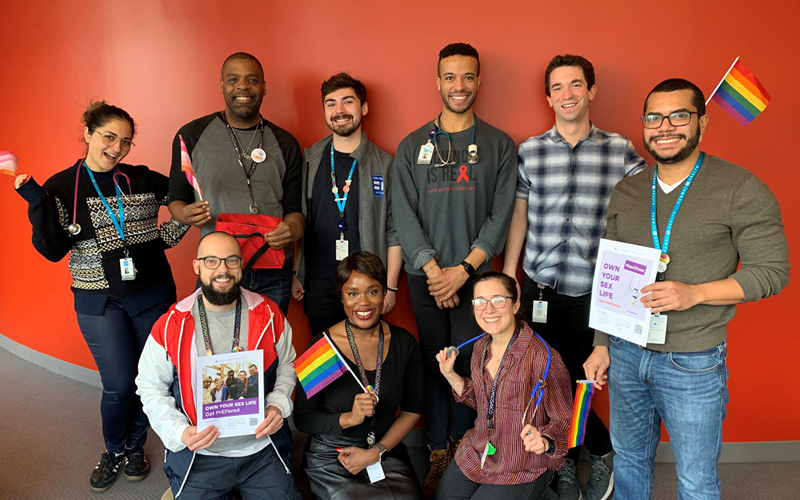RESEARCH
The Fenway Institute is one of the preeminent LGBTQIA+ health
and HIV research organizations in the world.
Fenway researchers and educators are frequently published in:
Our faculty present at national and international meetings and conferences including:
Biomedical Research
During fiscal year 2020, The Fenway Institute’s Biomedical Research team continued to conduct clinical trials looking at new approaches to preventing HIV infection. Our research recruitment team was recognized repeatedly for their ability to quickly enroll study participants and also worked to represent Fenway at Boston LGBT Pride, World AIDS Day, organizations such as the Multicultural AIDS Coalition and at presentations at local colleges and universities throughout the year. As COVID-19 forced many events to move online, research staff adapted to move their events online and to represent Fenway at virtual events organized by other community organizations.
The Fenway Institute has operated one of the nation’s first federally funded community-based HIV research programs and has been a site for NIAID network research since 1993. As an active site for the HIV Prevention Trials Network (HPTN) and HIV Vaccine Trials Network (HVTN), in March 2020, The Institute was deployed to work on COVID-19 research as part of the NIH Coronavirus Prevention Network (CoVPN).


Fenway completed the first CoVPN study in April and is now conducting clinical trials to evaluate COVID-19 vaccines as well as antibodies to protect household members of individuals who have COVID-19.
Phase I HIV prevention and vaccine studies
HPTN 083
In April 2020, The Phase III PrEP trial comparing injectable long-acting Cabotegravir to daily oral Truvada for HIV prevention study has shown efficacy and Cab LA will be going to the FDA for approval.
HPTN 089
In 2020, The Fenway Institute continues to explore 4 HIV antibodies in different combinations. The antibodies in HPTN089 are in the first phase of research; it is not an efficacy trial. Participants receive one infusion and participate in the study for 18 months.
HVTN 124
HVTN 124 examines both tolerability and the immune system’s response to a new HIV vaccine. This vaccine is made using laboratory products that look like HIV to generate an immune response. It is impossible for the vaccine to give someone HIV. Participation for this study includes 12 visits over the course of about 18 months.
HPTN 133
This phase I clinical trial to evaluates the safety and immunogenicity of an HIV-1 MPER peptide liposome vaccine in healthy, HIV-uninfected adult participants. Participants will attend several study visits through Month 12.
HVTN 706
Currently we are enrolling for a Phase 3 HIV Vaccine study called MOSAICO testing for the safety and efficacy of an investigational vaccine. MOSAICO is the third HIV vaccine efficacy trial in progress worldwide. This trial will enroll 3,800 HIV-negative men and transgender people aged 18 to 60 years who have sex with men and/or transgender people. Clinical research sites are in the US, Argentina, Brazil, Italy, Mexico, Peru, Poland and Spain.
Coronavirus Prevention Studies
Observational
HVTN 405
The purpose of this study is to learn more about infection with and recovery from the virus called severe acute respiratory syndrome coronavirus 2 (SARS-CoV-2). Some people know this virus by the name “coronavirus.” It can cause the disease called COVID-19. The information gained from the study will be used to help develop better tests for SARS-CoV-2 infection and COVID-19 disease and may help in developing future vaccines and treatments by allowing researchers to determine the difference between the body’s immune response to natural SARS-CoV-2 infection and immunization with a SARS-CoV-2 vaccine.
CoVPN 5001
The purpose of this study is to learn more about the acute response to infection with and recovery from the virus called severe acute respiratory syndrome coronavirus 2 (SARS-CoV-2). Some people know this virus by the name “coronavirus.” It can cause the disease called COVID-19. The information gained from the study can be used to help develop better tests for SARS-CoV-2 infection and COVID-19 disease and may help in developing future vaccines, other prevention strategies, and treatments.
Prevention
CoVPN 3002 and CoVPN vaccine studies
The COVID-19 Vaccine study is testing how safe and effective the vaccine is in protecting against COVID-19. Participants may be eligible if they are 18 years or older and have tested negative for COVID-19. There are 10 or more visits over the span of 1-2 years. More vaccine studies are on the horizon to begin enrollment before the end of 2020.
CoVPN 3502
The COVID-19 Household study is testing how safe and effective the treatment is in protecting people against COVID-19 exposure. Participants may be eligible if they are 18 years or older and have tested negative for COVID-19. There are 12 visits over the span of 10 months.
Other Biomedical Research Studies
PrEP @ Home
During fiscal year 2020, The Fenway Institute began enrolling for the PrEP @ Home Study, a trial of a home-based system of PrEP care that involves mail-in STI and HIV testing, as well as video conferences with a study provider. Since participants must be new to PrEP in order to be eligible, our research recruitment team has worked hard to develop new, creative outreach strategies to reach people not already engaged in PrEP care.
RCT2- Rectal chlamydia
RCT2, or the Rectal Chlamydia study, is part of a DMID sponsored STI clinical trial group (CTG) that Fenway was selected as a site for, comparing the efficacy of azithromycin vs. doxycycline in the treatment of rectal chlamydia in adults 18 years and older who were assigned male sex at birth. Enrollment began in summer of 2018 and is ongoing until we reach our target of 137 enrollees. The study found that doxycycline is superior to azithromycin for the treatment of rectal chlamydia, and has prompted the CDC to update its official treatment recommendations.
Syphilis
Another DMID STI CTG protocol, the Syphilis Study is assessing the effectiveness of a single 2.4 million unit dose of benzathine penicillin G (commonly referred to by the brand name Bicillin) vs. three doses given once weekly for three successive weeks in participants with primary, secondary or early latent syphilis. Eligible participants are adults 18 years and older of any gender.
ExGen
ExGen, or internally referred to as The Swab Study, compared the diagnostic abilities of four chlamydia and gonorrhea assays for rectal and oropharyngeal samples in adults 18 and over of any gender. We began enrolling in September 2018 and successfully enrolled 170 subjects before the study closed in June 2019.
nPEP
The nPep study is a phase IV open-label evaluation of safety, tolerability, and acceptability of a fixed-dose formulation of bictegravir, emtricitabine/tenofovir alafenamide (B/F/TAF) for non-occupational prophylaxis following potential exposure to HIV-1. This study was authored solely by Fenway Health. The primary objective of the study is to describe the safety and tolerability of a regimen containing BIC/F/TAF, once daily, when given for 28 days for prevention of HIV infection in HIV-1-seronegative adults after high-risk sexual contact. Every person enrolled will be screened and if eligible will receive a 28-day course of Biktarvy. Follow-up will include a total of 4 study visits over a 3-month period.
MyChoices
MyChoices is an intervention development and feasibility and acceptability study of MyChoices, a theory-driven mobile app to increase HIV testing and PrEP uptake by young men who have sex with men (YMSM), ages 15-24. MyChoices app will be refined in theater testing and an open technical pilot, and will then the acceptability and feasibility of this integrated app will be evaluated in a pilot randomized controlled trial (RCT) among YMSM at risk for HIV acquisition in the US. Phase III (RCT) opened to accrual in October 2018 and participant follow-up completed in November 2019. The cohort was fully enrolled with 60 participants on April 2019.
LifeSteps for PrEP for Youth
The ATN’s LSPY protocol will entail a two-phase study that includes individual, qualitative interviews with approximately 20 YMSM and 10 key informants for intervention adaptation and refinement; and a pilot randomized controlled trial (RCT) of up to 30 YMSM to assess feasibility, acceptability and preliminary efficacy of the LSPY compared to standard of PrEP care only to improve PrEP adherence. Our long-term goal is to develop scalable protocols to optimize at risk YMSM’s PrEP uptake and adherence in order to decrease HIV incidence. The adaptation for LifeSteps for PrEP for YMSM will be informed, developed, and refined through formative research that involves YMSM at all levels. Phase 1 has been completed, and enrollment of the pilot RCT is began in September 2019.
P3
P3 is a three arm, randomized-controlled trial (RCT) that will test the efficacy of the P3, a novel, theory-based mobile app that utilizes game mechanics and social networking features to improve PrEP adherence, retention in PrEP clinical care and PrEP persistence among young men who have sex with men (YMSM) and trans women who have sex with men (YTW), ages 16-24. We will test the efficacy of P3 and P3+, which adds Next Step Counseling delivered by an adherence counselor through the app, against PrEP standard of care. Participants will be randomized to P3, P3+, or standard of care. A cost comparison between P3 and P3+ will be conducted. Enrollment for P3 began in May 2019.
COMPARE
In years 1-3 of the iTech, we will have optimized and pilot-tested using a similar study design and identical study outcomes two distinct mobile apps, LYNX and MyChoices, designed to increase HIV testing and PrEP uptake among YMSM. The apps were developed based on different theories of behavior change, and therefore contain different components, differing messaging strategies and different approaches for engaging youth. The individual apps will be tested in this follow-on research study to evaluate for efficacy. Comparing the apps will allow us to identify any efficacy differences in increasing HIV testing or increasing PrEP uptake between the two apps. If justified, we will combine the components of each app that have the greatest impact on behaviors into a final, composite app for dissemination. Enrollment for COMPARE began in September 2019.
TechStep
TechStep is a two-condition, technology-based randomized controlled trial (RCT), with a stepped care approach, among high-risk HIV-negative trans feminine, trans masculine, and gender non-conforming (here after: trans*) youth for reducing sexual risk behaviors (e.g., condomless anal intercourse, engagement in sex work, sex while feeling the effects of alcohol or drugs) and increasing PrEP uptake. Enrollment for TechStep began in September 2019.
Behavioral Sciences Research Program
HIV and Behavioral Health Treatment

Epidemiological Research
The LEGACY Project is a longitudinal cohort of Fenway transgender and gender non-conforming patients. In fiscal year 2020, The Fenway Institute had 4,973 patients whose electronic health record (EHR) data is included in the cohort. Of those patients, 1,377 completed an additional survey that helps fill in the gaps in EHR data. This allows the Epidemiology team to look at more extensive psychosocial factors and patient experiences with hormones, surgeries, and other gender-confirming treatment. LEGACY’s enrollment recently ended.
The LITE study is a longitudinal cohort of transgender women. In fiscal year 2020, The Fenway Institute enrolled 159 participants at Fenway. Enrollment closed at the end of August. All participant study visits have been remote since March, due to COVID-19. Participants are mailed HIV home test kits and complete follow-up surveys either online, on the study app, or over the phone.
As part of the original design, Institute researchers follow participants for two years. Recently, The Institute received approval to follow participants for an additional two years, for a total of four years of longitudinal data. This makes the LITE Study the largest and longest cohort study of transgender women to date.
The LITEPlus study is a longitudinal cohort of Black and/or Latina transgender women that looks at the effects of stress on cardiovascular health. In fiscal year 2020, The Fenway Institute began enrollment for this study, but was forced to stop due to COVID-19 concerns. The Epidemiology team is currently revising study procedures and expects to resume participant enrollment shortly. The study team plans to hold as much of the study visits as possible over the phone, but participants will be required to come in person to Fenway for a blood draw and a few clinical measures such as height, weight, and blood pressure.
Life+Health
Life+ Health is a population based study of patients at Fenway Health and Mattapan Community Health Center (in partnership with Harvard T.H Chan School of Public Health) that aims to advance methods to measure and analyze multiple types of discrimination in population health research. In FY20, 200 Fenway patients enrolled in the study.
Project IMPACT is a longitudinal cohort study to test a behavioral intervention created for men who have sex with men who use stimulants (meth, cocaine, crack) in the context of sex. In FY20, 31 participants were enrolled at Fenway.
Data and Health Informatics
The Fenway Institute supports clinical, research and public health services through state of the art health informatics and data systems. Fenway’s Informatics and Data Center continues to be a leader among Community Health Centers in developing data capacity and Health Information Technology (HIT) innovations.
We continue to refine our integration with Electronic Patient Reported Outcomes (ePRO) enabling us to develop algorithms to better meet the clinical needs of patients and quality measures. They provide consultation and technical assistance on federal initiatives and to federal agencies and CHC’s on HIT, data management activities that streamline and improve data capture and reporting processes. Our Data Center collaborates with other departments to provide clinical, financial and productivity data.
The Center quickly developed and implemented technologies in response to COVID-19. As a result, Fenway was able to rapidly pivot to Telehealth to reach some of the most vulnerable populations. We care currently using telehealth for clinical care, research and public health initiatives. We collaborated with a vendor to develop automating the reporting of COVID-19 negative results to patients using text messaging.
The Center worked closely with AthenaHealth, our Electronic Health Records (EHR) vendor, to develop a product called ‘Centricity Now’ that will enable hospitalists and on-call providers to access to patient records wherever they are. We also work with other HIT vendors on initiatives using latest technologies to improve patient communication and health outcomes. For example, Fenway has collaborated on a project developing standards for using FHIR to transmit social determinants of health data. Additionally, we conduct webinars and in-person trainings around the US on SOGI implementation and analyzing outcomes.
The Data team has produced over 75 data analysis sets from our EHR focusing on LGBTQ patients, and continues to advise other EHR vendors on refining their products to meet the needs of the LGBTQIA+ patients. It also collaborates with national and federal partners to develop tools to monitor health outcomes; for example, Fenway worked with NACHC and CDC to evaluate a Hepatitis C Care Cascade. The Center participates in four national data registry projects whose funders include NIH and PCORI. These projects combine de-identified patient data into a shared clinical database to evaluate patient outcomes in real world settings.
C-NICS
The Centers for AIDS Research (CFAR) Network of Integrated Clinical Systems (CNICS) research network integrates longitudinal clinical data and treatment management of persons living with HIV (PLWH) and provides research infrastructure to support HIV-associated clinical, social, behavioral outcomes, and comparative effectiveness research using data collected from 8 Centers for AIDS Research clinical sites across United States. Since 2001, 2,743 patients at Fenway Health have enrolled into C-NICS and 14,985 individual blood specimens have been collected and processed for the biological specimen repository.
NA-ACCORD
An NIH-funded data registry that is a regional collaboration of single-site and multi-site cohorts that includes over 90,000 patients from more than 50 sites throughout the United States and multiple provinces in Canada. Comprised of both academic medical centers and community-based facilities that deliver HIV-primary and specialty care, this registry combines classical epidemiological and clinical HIV cohorts, includes both HIV-seropositive and seronegative persons, and is complemented by specimen repositories for conducting translational research.
PCORnet & ADVANCE
Of the 12 national networks that make up PCORNet, a patient-centered data registry that helps answer questions important to patients, Fenway Health contributes data quarterly to the ADVANCE network. ADVANCE is the nation’s largest safety-net community laboratory, consisting of researchers, patients and clinicians. ADVANCE’s is currently composed of 6,389,086 patients, 161 health systems, 30 states, and 1,461 clinic sites. Since the beginning of pandemic in 2020, Fenway has also been contributing weekly COVID-19 related data to ADVANCE.




